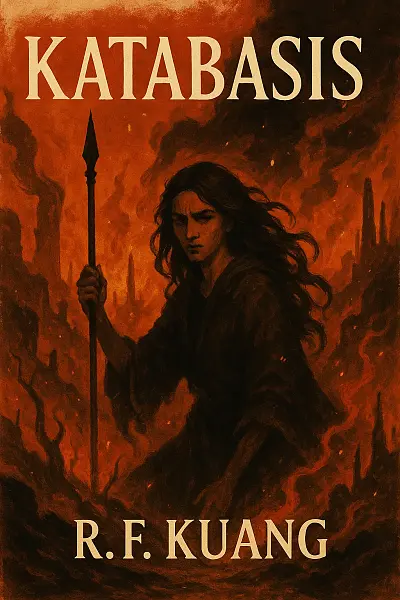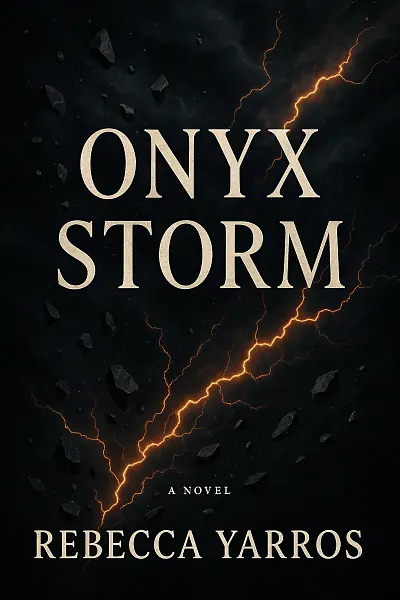
Katabasis
by: R.F. Kuang
Alice Law’s whole life revolves around crushing it in Magick at Cambridge, chasing the approval of legendary Professor Grimes—until he dies in a magical disaster that might be her fault. Suddenly, Alice's cutthroat academic grind is derailed; retrieving Grimes’s soul from Hell becomes her only shot at saving her future.
Teamed up (unwillingly) with her rival Peter Murdoch, Alice has to navigate a literal underworld, weighing shredded pride against something way scarier: sacrificing herself—or worse, her ambitions.
The story’s got those deliciously high emotional stakes and tense banter, all wrapped in a darkly witty, urgent narrative. Will they make it back with what matters most?
"To descend is not to surrender, but to face the darkness that shapes what we choose to become."
Let's Break This Down
The Author's Voice
Atmosphere:
Katabasis plunges readers into an intensely immersive world, layering every scene with a sense of underlying dread and urgency. The mood oscillates between claustrophobic tension and bursts of surreal unreality, making you feel like you’re sinking deeper with every page. Kuang deftly conjures settings that are both vividly real and steeped in mythic resonance—expect a landscape that’s as hostile as it is fascinating, where shadows linger just out of sight and uncertainty is a constant companion.
Prose Style:
R.F. Kuang’s writing is razor-sharp and unflinchingly direct, yet laced with unexpected lyricism. The sentences alternate between taut, punchy declarations and breathtakingly beautiful descriptions, creating an intoxicating rhythm you won’t want to break. Dialogues feel authentic and charged, often doing heavy emotional lifting without tipping into melodrama. There’s a raw honesty here—a refusal to flinch from brutality—counterbalanced by moments of quiet introspection that land with surprising tenderness.
Pacing:
The pacing in Katabasis is deliberately relentless—you’re thrust into the action early, with rare moments to catch your breath. Kuang isn’t afraid to slow down for introspective beats, but these pauses always serve the narrative’s momentum rather than undermine it. You get this sense of constant forward propulsion, like tumbling down a slope with no way to stop, yet every sequence is purposeful and measured. Expect a journey that’s equal parts breakneck and reflective, keeping you on high alert while rewarding you with rich character work and thematic depth.
Tone & Mood:
There’s no sugarcoating here—Katabasis is brutally honest, often bleak, and unafraid to dwell in moral gray areas. The tone is sharp, even caustic at times, but also tinged with vulnerability and flashes of dark humor. This blend of cynicism and compassion gives the narrative real bite while letting moments of hope and connection shine through.
Imagery & Symbolism:
Kuang leans into evocative, sometimes jarring imagery—think visceral details and symbols drawn from mythology and history, layered with contemporary resonance. Metaphors are wielded with precision; the imagery doesn’t just decorate but deepens the psychological stakes of the story.
Dialogue:
Conversations crackle with subtext, often revealing more through what’s left unsaid. The exchanges are quick, sometimes biting, but always purposeful—there’s no wasted breath here, and the tension between characters feels palpable and authentic.
Overall Vibe:
If you’re drawn to fiction that’s as gripping as it is thoughtful—where atmosphere carries real emotional heft and the writing style pulls no punches—Katabasis delivers. Kuang’s approach combines literary ambition with the raw propulsion of great speculative fiction, making every page feel both urgent and unforgettable.
Key Moments
- Descent into literal and metaphorical underworlds—grief, guilt, and ghostly corridors collide
- Linguistic fireworks: jagged prose and sly footnotes that break the fourth wall with delicious irreverence
- That subway scene where reality splits—and so does your heart
- Childhood friendships tested in the fires of shared trauma—raw, ruthless, unforgettable
- Gallows humor woven through academic disillusionment (and surprisingly sharp coffee shop banter)
- Dark academia meets mythic reckoning: every chapter steeped in tension and existential dread
- A finale that dares you to look away, even as it shatters every easy answer
Plot Summary
Katabasis by R.F. Kuang follows Robin Swift on a perilous journey through the underworld after his decision at the end of Babel leads to catastrophic consequences. The story opens with Robin grappling with regret over his revolutionary choices, as he is thrust—quite literally—into a shadowy realm that blurs myth and reality. Alongside reluctant allies, he confronts spectral adversaries and fragments of his own past, culminating in a desperate struggle to return to the world of the living. The climax reveals that true escape means confronting his guilt and the legacy of violence he’s left behind, forcing Robin to sacrifice his personal desires for the hope of broader societal redemption. In the resolution, Robin emerges changed, forever bearing the scars of his journey below, but more acutely aware of the complexities of resistance and the price of change.
Character Analysis
Robin Swift stands at the heart of the novel—initially tormented by guilt and torn between rebellion and responsibility. As he traverses the underworld, his motivations shift from self-preservation toward genuine accountability and empathy for the burdens of others. Supporting characters, like Victoire and Ramy, resurface in spectral or symbolic forms, acting as both guides and moral challengers. By the end, Robin's development is marked by painful maturity, as he accepts that revolutionary outcomes often defy the black-and-white ideals he once held.
Major Themes
The novel dives deep into consequences and redemption, with Robin’s katabasis (descent) serving as both literal and metaphorical reckoning for his actions. Colonial oppression and the ethics of revolution remain central, explored via Robin’s encounters with the lingering dead—victims, oppressors, fellow revolutionaries. Identity and belonging are interrogated as Robin faces elements of his Chinese heritage and English upbringing, ultimately realizing that true change requires embracing contradictory parts of oneself and one's community. The text repeatedly asks what individuals owe to their past and what sacrifices should be made for future generations.
Literary Techniques & Style
Kuang’s prose is sharp and evocative, fusing academic precision with lush, sometimes dreamlike, description. The narrative structure alternates between Robin’s journey through the underworld and fragmented memories of Oxford, creating a disorienting, immersive experience reflective of his psychological state. Symbolism abounds, especially in the recurring motifs of doors, shadows, and bridges, which represent choices, moral ambiguity, and possibilities of return. Extended metaphors about translation and language continue, underscoring how words can both wound and heal.
Historical/Cultural Context
Set in a fantastical Oxford informed by real 19th-century British imperialism, Katabasis draws heavily on both classical myth (the underworld journey) and the actual legacies of anti-colonial movements. Kuang layers in references to linguistic imperialism, translation theory, and Chinese folklore, making the story resonate with debates about decolonization and cultural hybridity. The tensions between Western academic traditions and marginalized identities shape both the setting and the conflicts.
Critical Significance & Impact
Katabasis has been praised for its bold, genre-defying exploration of moral ambiguity, standing out as both a powerful sequel and a sophisticated meditation on revolution’s costs. Readers and critics alike have highlighted its unique blend of fantasy, historical commentary, and psychological depth, cementing Kuang’s reputation as a leading voice in contemporary speculative fiction. The story’s unflinching honesty and inventive structure have sparked fresh discussions about resistance, complicity, and the power of storytelling to imagine new worlds.

A descent into darkness, where myth and memory reshape destiny.
What Readers Are Saying
Right for You If
Are You the Kind of Reader Who’ll Love Katabasis by R.F. Kuang?
So, let’s be real—this book’s not for everyone, but if you find yourself nodding along to any of the points below, you might just be its perfect match:
You’ll probably LOVE this if:
- You’re a fan of dark academia and morally complex characters. If you liked Babel or anything that gets a little gritty with its magic and history, jump in.
- Unapologetic, raw explorations of power, ambition, and the cost of knowledge really do it for you. This book pulls no punches when it comes to consequences.
- You enjoy rich world-building with a dash of alternative history and mythology. Kuang doesn’t do “surface level”—you’ll get layered societies, languages, and all the nitty gritty.
- You like books that make you think. If you want to be challenged, to pause and mull over themes and character motives, this one delivers.
- A bit of suffering in your stories is your thing. I know, sounds dramatic, but some of us live for that emotional gut punch and questioning-what’s-right-or-wrong vibe.
- You love when a book makes you google stuff. If you’re a deep diver and lore enthusiast, you’ll be in your element.
But honestly, you might want to skip it if:
- You’re after a fast-paced, action-heavy fantasy. The pacing here is thoughtful and the focus is more on ideas than big fights.
- You like super clear-cut heroes and happy endings. Characters here make messy choices, and it can get morally gray—so if you loathe ambiguity, it could frustrate you.
- You prefer breezy, feel-good reads. Not gonna lie, Katabasis punches hard and stays heavy. If you need comfort over challenge, grab something lighter.
- You’re new to fantasy or want an easy “entry level” read. This is dense and expects you to keep up.
Bottom line:
If you’re in for complex themes, brainy magic systems, and stories that aren’t afraid to get a little dark, Katabasis belongs on your TBR. If not, no shame—there are tons of other adventures out there!
What You're Getting Into
Ready for a wild ride through ambition, haunting secrets, and razor-sharp academia?
Katabasis drops you right into an elite, cutthroat university where a group of young scholars grapple with dangerous knowledge and the murky line between genius and destruction. When their pursuit of truth exposes long-buried traumas and loyalties are tested, the characters must confront not just the system they're a part of, but the darkness within themselves—setting the stage for a tense, atmospheric, and emotionally charged journey you won't soon forget.
Characters You'll Meet
-
Robin Swift: Reluctant protagonist drawn ever deeper into revolution. His intellectual curiosity and growing moral conviction fuel the story's heart.
-
Ramiz Ahmed: Robin’s fiercely principled ally whose unwavering dedication to the cause both inspires and challenges those around him.
-
Letitia Price: A sharp, ambitious scholar who wrestles with loyalty and self-preservation as the movement intensifies.
-
Victoire Desgraves: Compassionate and idealistic, she becomes the emotional glue of the group, confronting her own limits while advocating for justice.
-
Professor Richard Lovell: The enigmatic mentor whose manipulations and secrets cast a long shadow over the students’ journey and choices.
More Like This
If The Poppy War hooked you with its darkly intricate blend of history and fantasy, Katabasis will feel like a natural next obsession—R.F. Kuang once again deftly weaves together the high stakes of personal survival and cataclysmic societal change, reminiscent of the emotional complexity and moral ambiguity found in The Song of Achilles by Madeline Miller. Both novels anchor mythic journeys in raw, human vulnerability, giving readers layered protagonists forced to confront not just epic dangers, but their own haunted pasts.
Fans of The Fifth Season by N.K. Jemisin will spot thematic parallels here too: Kuang’s worldbuilding resonates with Jemisin’s apocalyptic landscapes, and both authors excel at unspooling generational trauma and the burden of power through suspenseful, tightly plotted narratives. These stories don’t just invite you into new worlds—they pull you deep into questions of identity and resilience, using lush prose and inventive structures to keep the pages turning.
On the screen, Katabasis channels the relentless pacing and psychologically-charged atmosphere of The Terror (AMC). Like that chilling expedition through icy wastelands, Kuang’s tale traps its characters in a hostile, unknown environment, slowly ratcheting up tension and forcing every secret into the open. The creeping sense of dread—where threat comes as much from within the group as from the world outside—makes this a binge-read for anyone who loves spine-tingling, character-driven stories.
Critic's Corner
What would you sacrifice for ambition—a loved one, your morals, your very soul?
Katabasis by R.F. Kuang refuses to flinch from this question, pushing its driven characters into a literal descent through Hell itself. In a highly competitive field where genius is gospel, Kuang dares readers to consider what we might lose on the long climb to greatness.
Kuang’s writing here stings and shimmers in equal measure. Her prose slices with the precision of Alice’s own intellect—cool, razor-sharp, yet unexpectedly laced with vulnerability. The narrative flits with electric energy between claustrophobic academic settings and the infernal wildness of the underworld, employing brisk, rhythmic sentences that keep tension tightly wound. Dialogues crackle with wit; rivalry between Alice and Peter is not just told, but felt in their exchanges—sarcasm, jealousy, occasional desperate empathy. Kuang’s world-building is both compact and startling: Hell is imagined with a lonely, bureaucratic horror that feels unnervingly modern. She blends grotesque, inventive imagery with snatches of Cambridge banter and sly literary allusions, inviting active participation as much as immersion. While the pacing dazzles in its opening movements and moments of infernal revelation, certain middle sections sag under repetition—rivalry and regret retraced perhaps once too often. Kuang’s technical skill is never in doubt, but a sharper editorial scalpel could have heightened the book’s already ferocious momentum.
At its heart, Katabasis excavates themes both timely and timeless: the corrosive nature of academic aspiration, the haunted geography of blame, and the ferocious cost of ambition in a world where failure isn’t just professional—it’s existential. What does it mean to save someone who might not want rescuing? Kuang probes the rotted underbelly of institutional prestige, cleverly using the afterlife as a metaphor for the purgatories of late-stage academia. Alice’s journey isn’t just physical but metaphysical—her guilt and competitiveness are rendered with a pointed honesty, examining the thin line between devotion and destruction. The book interrogates who gets to belong, who must pay for genius, and whether redemption is possible after unforgivable mistakes. In a cultural moment obsessed with hustle and self-sacrifice, Katabasis stares down our workaholic compulsions and asks if they’re really worth the immortal cost.
Falling somewhere between dark academia and existential quest, Kuang’s novel feels indebted to Donna Tartt’s The Secret History, yet twists the tradition by dragging the battle out of the lecture hall and into the infernal. Fans of Kuang’s Babel will find her signature blend of biting social critique and genre playfulness, though the tone here is more feverishly surreal. Within the evolving landscape of speculative fiction, Katabasis stands as a fierce, gothic counterpoint to more sanitized campus narratives.
While Katabasis doesn’t always escape the gravity of its own ambitions—some emotional beats are over-insistent, a few character arcs predictable—its daring, darkly comic vision and scalpel-sharp prose make it unmissable for lovers of literary speculative fiction. Kuang’s caustic, compassionate unflinching gaze is exactly what the genre needs now.
Community Thoughts
I nearly threw the book across the room after that one line: "There is no return." It echoed in my head all night, made me question every choice I've ever made. Kuang really knows how to get under your skin.
i swear, that scene with the river crossing and the silent companion? didn't sleep for hours. kept checking dark corners like i expected something to crawl out. kuang, why you gotta mess me up like this?
okay but THAT ONE LINE when the river spoke back? i legit had to close the book and just stare at my ceiling. haunted in the best possible way. katabasis is here to ruin your peace and you'll thank it for doing so
so there’s this line in Katabasis that’s been echoing in my head for days: “Descent is only the beginning.” can’t get rid of the chill it gives me. how does Kuang do this every time?
Honestly, Katabasis had me questioning my own reality after THAT CHAPTER. I thought I was safe, then Kuang just shattered everything. Spent hours staring at my ceiling, haunted by one character’s choices. Sleep? Not an option.
Leave Your Review
Local Take
Why It Matters
Katabasis by R.F. Kuang strikes a powerful chord in this cultural context, drawing parallels with historical periods of upheaval and resistance. Readers here, with memories of colonial legacies and modern protests, will see echoes of their own struggle for identity and autonomy in the protagonists’ descent into chaos and reckonings with power.
- The book’s themes of sacrifice, guilt, and the cost of revolution mesh deeply with local narratives where collective trauma and resilience define national consciousness.
- Some plot choices—like the moral ambiguity of rebellion—might clash a little with mainstream cultural emphasis on unity and clear heroes, sparking lively debate.
- Kuang’s willingness to question authority and disrupt tradition resonates with a younger generation eager for change, pushing against conventions that linger in both politics and literature.
In short, Katabasis doesn’t just echo local history—it stirs it up, confronting readers with uncomfortable truths and inspiring new conversations.
Food for Thought
Notable Achievement for Katabasis by R.F. Kuang:
Since its release, Katabasis has quickly skyrocketed onto bestseller lists and sparked widespread conversation for its bold exploration of grief, power, and memory; readers and critics alike praise Kuang's signature blend of biting wit and social commentary, cementing her reputation as one of the most exciting voices in speculative fiction today.
Like what you see? Share it with other readers







